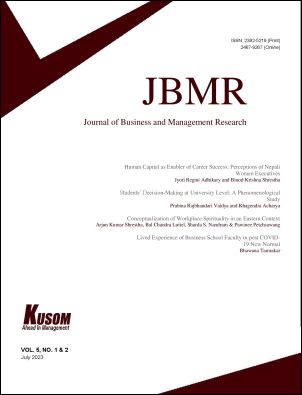Conceptualization of Workplace Spirituality in an Eastern Context
DOI:
https://doi.org/10.3126/jbmr.v5i1-2.58570Keywords:
bhagavadgItA , Buddhist spiritual tradition, constructivist grounded theory, Vedic spiritual tradition, workplace spiritualityAbstract
Workplace spirituality is a complex construct and is perceived differently in different cultures and contexts. The purpose of this study was to construct the meaning of workplace spirituality from the perceptions of employees in an Eastern context, particularly Nepal, which is primarily dominated by the Vedic and Buddhist spiritual traditions. This study utilized the constructivist grounded theory methodology to elucidate the meaning of WPS. The analysis of data revealed that WPS is a multi-dimensional construct having nine distinct dimensions – Altruistic Motive, Interpersonal Positivity, Compassion, Inner Calmness, Duty Orientation, Sense of Collaboration, Interconnectedness, Self-Regulation, and Higher Consciousness. The emergence of these dimensions is discussed in light of the Western WPS literature and the teachings of Vedic and Buddhist spiritual traditions. Finally, practical and research implications are drawn and the study's limitations are highlighted.
Downloads
Downloads
Published
How to Cite
Issue
Section
License

This work is licensed under a Creative Commons Attribution-NonCommercial-NoDerivatives 4.0 International License.
This license enables reusers to copy and distribute the material in any medium or format in unadapted form only, for noncommercial purposes only, and only so long as attribution is given to the creator.




